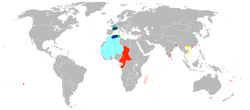 Global Information
Global InformationFree France information
Free France France libre (French) | |||||||||
|---|---|---|---|---|---|---|---|---|---|
| 1940–1944 | |||||||||
 Flag
 Cross of Lorraine
(1940–1944) | |||||||||
| Anthem: "La Marseillaise" (official) "Chant des Partisans" (unofficial)[1] ("Song of the Partisans") | |||||||||
 See map legend for color descriptions; sky blue = colonies under the control of Free France after Operation Torch | |||||||||
| Status | Government-in-exile (until November 1942) Provisional government over unoccupied and liberated territories (after November 1942) | ||||||||
| Capital | Paris (de jure) London (de facto) (until November 1942) Brazzaville Algiers (de facto) (after November 1942) | ||||||||
| Common languages | French, others | ||||||||
| Religion | Secular state | ||||||||
| Demonym(s) | French | ||||||||
| Chairman of National Committee | |||||||||
• 1940–1944 | Charles de Gaulle | ||||||||
| Historical era | World War II | ||||||||
• de Gaulle's appeal | 18 June 1940 | ||||||||
• Empire Defense Council | 11 July 1940 | ||||||||
• French National Committee | 24 September 1941 | ||||||||
• National Liberation Committee | 3 June 1943 | ||||||||
• Brazzaville Conference | 8 February 1944 | ||||||||
• Provisional Government | 3 June 1944 | ||||||||
| |||||||||
| History of France |
|---|
 |
| Topics |
|
| Timeline |
|
|
Free France (French: France libre) was a political entity that claimed to be the legitimate government of France following the dissolution of the Third Republic. Led by General Charles de Gaulle, Free France was established as a government-in-exile in London in June 1940 after the Fall of France during World War II and fought the Axis as an Allied nation with its Free French Forces (Forces françaises libres). Free France also supported the resistance in Nazi-occupied France, known as the French Forces of the Interior, as well as gained strategic footholds in several French colonies in Africa.
Following the defeat of the Third Republic by Nazi Germany, Marshal Philippe Pétain led efforts to negotiate an armistice and established a German puppet state known as Vichy France. Opposed to the idea of an armistice, de Gaulle fled to Britain, and from there broadcast the Appeal of 18 June (Appel du 18 juin) exhorting the French people to resist the Nazis and join the Free French Forces. On 27 October 1940, the Empire Defense Council (Conseil de défense de l'Empire)—later the French National Committee (Comité national français or CNF)—formed to govern French territories in central Africa, Asia, and Oceania that had heeded the 18 June call.
Initially, with the exception of French possessions in the Pacific, India, and Equatorial Africa,[note 1] all the territories of the French colonial empire rejected de Gaulle's appeal and reaffirmed their loyalty to Marshall Pétain and the Vichy government.[2] It was only progressively, often with the decisive military intervention of the Allies, that Free France took over more Vichy possessions, securing the majority of colonies by November 1942.
The Free French fought both Axis and Vichy troops and served in almost every major campaign, from the Middle East to Indochina and North Africa. The Free French Navy operated as an auxiliary force to the Royal Navy and, in the North Atlantic, to the Royal Canadian Navy.[3] Free French units also served in the Royal Air Force, Soviet Air Force, and British SAS, before larger commands were established directly under the control of the government-in-exile. On 13 July 1942, "Free France" was officially renamed Fighting France (France combattante) to mark the struggle against the Axis both externally and within occupied France.
From a legal perspective, exile officially ended after the reconquest of North Africa since it allowed the Free French government to relocate from London to Algiers.[note 2] From there, the French Committee of National Liberation (Comité français de Libération nationale, CFLN) was formed as the provisional government of all French. The government returned to Paris following its liberation by the 2nd Armoured Free French Division and Resistance forces on 25 August 1944, ushering in the Provisional Government of the French Republic (gouvernement provisoire de la République française or GPRF). The provisional government ruled France until the end of the war and afterwards to 1946, when the Fourth Republic was established, thus ending the series of interim regimes that had succeeded the Third Republic after its fall in 1940.
On 1 August 1943, L'Armée d'Afrique formally united with the Free French Forces to form the French Liberation Army. By mid-1944, the forces of this army numbered more than 400,000, and they participated in the Normandy landings and the invasion of southern France, eventually leading the drive on Paris. Soon they were fighting in Alsace, the Alps and Brittany. By the end of the war, they were 1,300,000 strong—the fourth-largest Allied army in Europe—and took part in the Allied advance through France and invasion of Germany. The Free French government re-established a provisional republic after the liberation, preparing the ground for the Fourth Republic in 1946.
- ^ Dompnier, Nathalie (2001). "Entre La Marseillaise et Chant des Partisans quel hymne pour le régime de Vichy ?". In Chimènes, Myriam (ed.). La vie musicale sous Vichy. Histoire du temps présent (in French). Bruxelles: Éditions Complexe – IRPMF-CNRS, coll. p. 71. ISBN 978-2-87027-864-2.
- ^ French India, New Caledonia/New Hebrides and French Polynesia, were totally dependent economically and for their communication on British and Australian goodwill and support for Vichy was not a realistic option. Jean-Marc Regnault and Ismet Kurtovitch, "Les ralliements du Pacifique en 1940. Entre légende gaulliste, enjeux stratégiques mondiaux et rivalités Londres/Vichy", Revue d'histoire moderne et contemporaine, vol. 49, No. 4 (Oct. – Dec., 2002), p. 84–86
- ^ Stacey 2007, p. 373.
Cite error: There are <ref group=note> tags on this page, but the references will not show without a {{reflist|group=note}} template (see the help page).